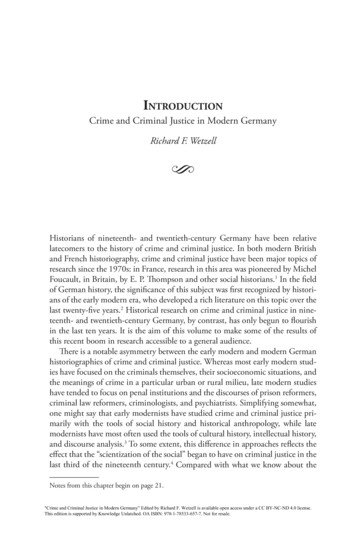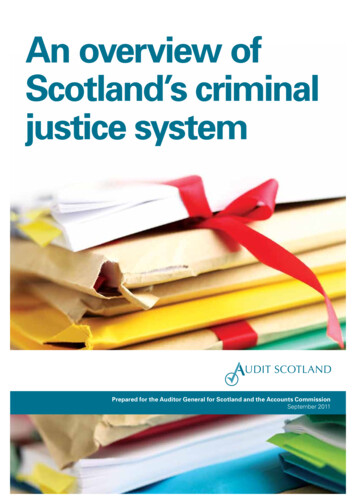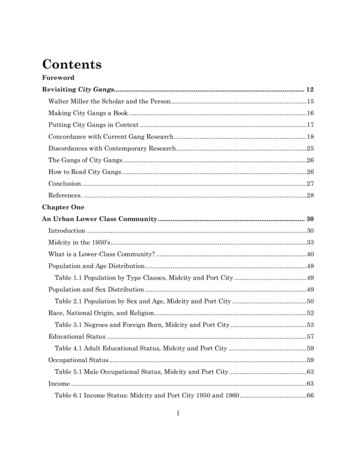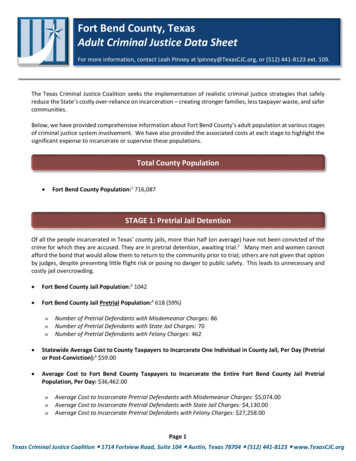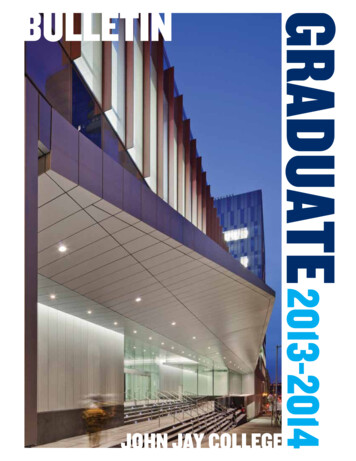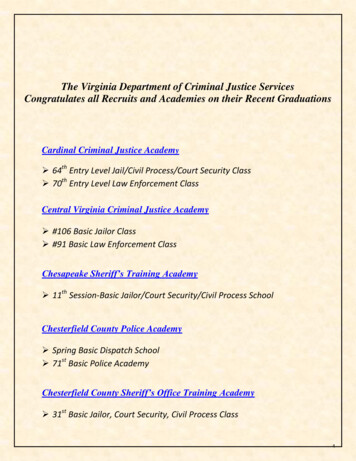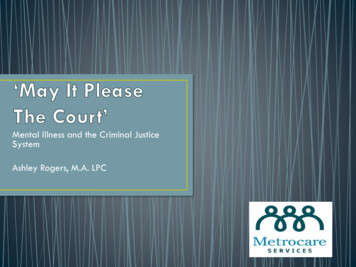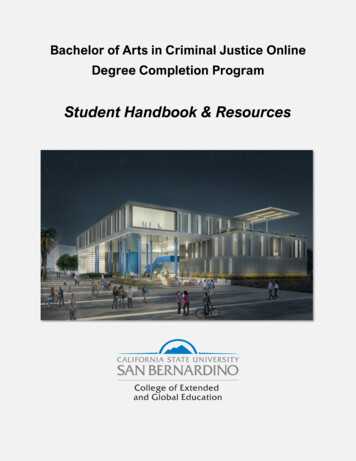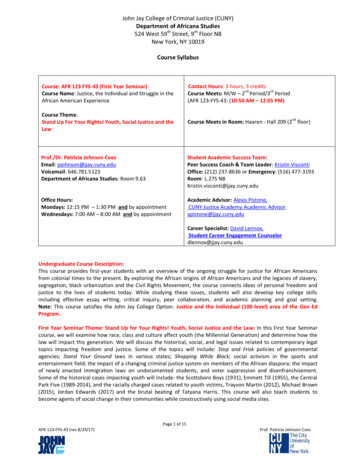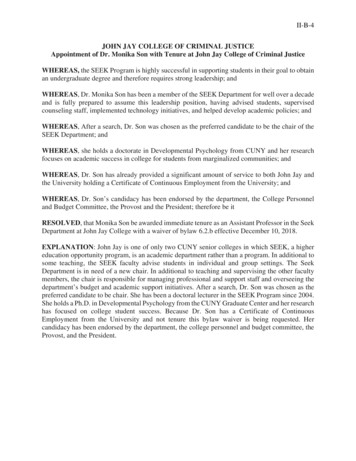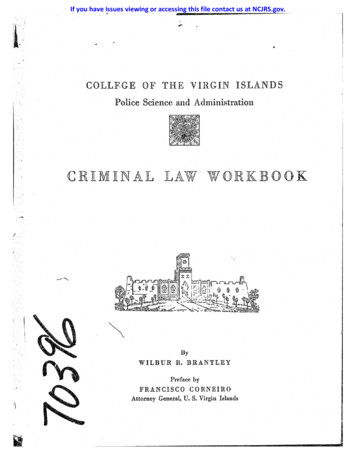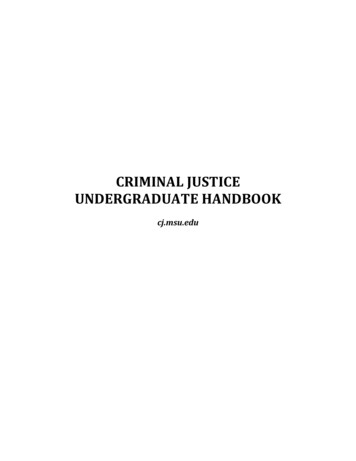
Transcription
CRIMINAL JUSTICEUNDERGRADUATE HANDBOOKcj.msu.edu
CONTENTSTables of Contents1Department Contact Information2Welcome to Criminal Justice3General University Requirements4College of Social Science (CSS) Requirements5Criminal Justice Major Requirements7Criminal Justice Course Descriptions8Requirements for the Minor in Security Management11Career Advising and Services12Opportunities and Resources13Policies & Procedures14Academic Integrity: A Core Value at MSU15Academic Planning Worksheet16Four-Year Graduation Planning Document17Criminal Justice Undergraduate Handbook 1
DEPARTMENT CONTACT INFORMATIONSchool of Criminal Justice655 Auditorium Road, Room 557Baker HallMichigan State UniversityEast Lansing, MI 48824517-355-2197https://cj.msu.edu/Thomas HoltDirector and ProfessorBaker Hall, Room 544holtt@msu.edu; 517 353-9563April ZeoliDirector, Undergraduate StudiesBaker Hall, Room 526zeoli@msu.edu; 517-353-9554Barbara KolarAcademic AdvisorBaker Hall, Room 128kolarba@msu.edu; 517-353-9866Sara TauqiAcademic AdvisorBaker Hall, Room 126tauqisar@msu.edu; 517-355-4679Tim HombergCareer AdvisorBaker Hall, Room 130hombergt@msu.edu; 517-432-3197Peggy DonahueUndergraduate SecretaryBaker Hall, Room 557donahu38@msu.edu; 517-432-5574Student Resource RoomBaker Hall, Room 135Complete list of CJ Faculty & Staff: https://cj.msu.edu/directory/index.htmlCriminal Justice Undergraduate Handbook 2
Welcome to Criminal Justice!Welcome to the School of Criminal Justice! We, the advisors and faculty, are eager to assist you in anyway so please seek us out. This handbook is designed to help you with academic planning.By declaring Criminal Justice as your major, you have taken an important step in achieving your futuregoals. The Criminal Justice degree completion requirements include a structured set of courses requiredby the University, the College of Social Science and Criminal Justice. Our students typically havesignificant flexibility to customize their academic experience due to a generous number of electivecredits available within the degree structure. CJ students engage in internships, study abroad,volunteering, clubs and professional associations, and research.Make an Appointment with a CJ Advisor!The best way to manage your academic and career plan is to meet regularly with an advisor! Werecommend connecting with your academic advisor each semester. Regular interaction with youradvisor is the best way to stay on track. To schedule an appointment, visit the website atstudent.msu.eduCheck your financial aid, refunds, grades, holds, enrollment by term and subject and enrollmentappointments via StuInfo: https://stuinfo.msu.edu/Menu.AspCriminal Justice Undergraduate Handbook 3
BACHELOR OF ARTS DEGREE IN CRIMINAL JUSTICEUNIVERSITY REQUIREMENTSUniversity Writing RequirementsComplete a 4-credit Tier I writing course from the Department of Writing, Rhetoric and American Culture (WRA).1. Students who place in the Developmental Level Writing Course (WRA 1004 and WRA 0102) mustcomplete that course and the Tier I writing course.2. Students who score 3 on the Advanced Placement Test may waive the Tier I course. Students who score4 or 5 will receive credit for the Tier I course.3. Students who complete the Tier I writing course with a grade of 0.0 must repeat the course.*The University’s Tier II writing requirement is completed the student’s senior year with one of thefollowing approved criminal justice writing courses: CJ 424W, CJ 426W, CJ 427W, CJ 430W, or CJ 465W.Integrative Studies RequirementIntegrative Studies in Arts and Humanities**1. IAH 201-210 (4 credits) Prerequisite – WRA (Tier I writing requirement) with at least a 1.02. A second IAH course, 211 or higher (4 credits) Prerequisite – IAH 201-210Integrative Studies in Social, Behavioral and Economic Sciences **1. One 200 level ISS course (4 credits)2. One 300 level ISS course (4 credits) Prerequisite – ISS 200 level courseIAH/ISS Diversity Distribution Requirement: MSU undergraduates must complete courses in at least two of threediversity categories (“D”, “N” & “I”) as part of their IAH and/or ISS requirements. “N” – emphasizes nationaldiversity; “I” – emphasizes international and multicultural diversity and “D” – emphasizes both national andinternational/multicultural diversity.Integrative Studies in Natural Science1. One ISB course (3 credits)2. One ISP course (3 credits)3. One ISB or ISP lab (2 credits)Some colleges, departments and schools allow students in their programs to complete an approved alternativetrack in natural science. These alternatives are stated in the college, department and school requirements.Students who change majors from a program with an approved alternative to a program without an alternativewill be given credit for the completed portion of the alternative.University Mathematics RequirementStudents may fulfill the university mathematics requirements by either:A. Receiving an official MSU placement test score of 19 or better on the proctored NSO exam – OR –B. Completing the following at MSU or receiving transfer credit for:1. A total of one course:With at least one course from LB 118; MTH 110; MTH 116OR2. A total of two courses:With at least one course from MTH 101 OR MTH 102 OR MTH 103; MTH 103 WAIVERAND at least one course from MTH 112; MTH 114; MTH 124; MTH 132; MTH 152H, MTH 201; STT200; STT 201*Please note that Criminal Justice majors are required to take STT 200 or STT 201.COLLEGE OF SOCIAL SCIENCE REQUIREMENTSCriminal Justice Undergraduate Handbook 4
Link CSS Curriculum Overview: College of Social Science Curriculum OverviewA. Experiential Learning RequirementThe experiential learning requirement may be met by completing a 3 – 4 credit experiential learning course, andis designed to ensure that each undergraduate student will have the opportunity to enhance problem-solving andintegrative reasoning skills through practice outside of the traditional classroom learning environment. Otheroptions include study abroad, study away, internships, service learning and civic engagement experiences,undergraduate research, including, in appropriate cases, honors theses and entrepreneurship experiences. Meetwith your advisor to explore the options.Examples of experiences that will satisfy this requirement:-CJ 494CJ 493CJ 490SSC 199SSC 493Criminal Justice PracticumUndergraduate Research in CJIndependent Study (Must be approved by advisor)Community Engagement: Act Locally, Think GloballySocial Science InternshipVariable CreditVariable CreditVariable Credit3Variable creditClick on the link below to view current listing of courses meeting this requirement:Experiential Learning CoursesB. Interdisciplinary Minor RequirementComplete a minimum of 15-18 credits in one interdisciplinary minor from a list of minors approved by the Collegeof Social Science. Click on the link below to view approved minors for this requirement:CSS Interdisciplinary MinorsApproved minors 18.19.20.African American and African Studies - Social Science TrackAfrican StudiesAsian Pacific American Studies - Social Science TrackAsian Studies,Chicano/Latino StudiesCities: Environment, Design and SocietyCognitive Science- Social Science TrackEnvironment and HealthHuman Behavior and Social ServicesInternational DevelopmentJewish Studies - Social Science TrackLatin American and Caribbean StudiesLaw, Justice and Public PolicyLeadership of OrganizationsLesbian, Gay, Bisexual, transgender, Queer and Sexuality- Social Science TrackPeace and Justice Studies - Social Science TrackRace and Ethnicity in the United StatesSocial Science Quantitative Data AnalyticsWomen’s and Gender Studies- Social Science TrackYouth and SocietyCriminal Justice Undergraduate Handbook 5
C. Science, Technology, Engineering & Mathematics (STEM) RequirementComplete a minimum of 6 credits in Science, Technology, Engineering, and Mathematics (STEM) courses from alist of courses approved and maintained by the College of Social Science Committee on Curriculum and AcademicPolicy. Mathematics 1825, 100E, 103E and 290 may not apply to this requirement for the degree.Link to STEM course options:Course Listing for CSS STEM RequirementPopular STEM Course Options:ANP 203ANP 206CSUS 200ENT 205GEO 203GEO 206HNF 150HST 250(3)(3)(3)(3)(3)(3)(3)(3)Introduction to ArchaeologyIntroduction to Physical AnthropologyIntroduction to SustainabilityPests, Society and EnvironmentIntroduction to MeteorologyPhysical GeographyIntroduction to Human NutritionHistory and Technology of the Digital Age*The mathematics or statistics course taken in fulfillment of the University Mathematics Graduation Requirementmay NOT also apply to the college requirement in STEM.D. College Credit Distribution Requirements1. A minimum of 30 semester credits at the 300 level or above.2. A maximum of 12 semester credits of independent study* may be applied toward degree requirements(see #4).3. A maximum of 12 semester credits of internships and field experience credits may be applied toward thedegree requirements (see #4).4. The total of independent study, internship and field experience credits may not exceed 20 credits.Courses taken to satisfy college and/or major requirements may NOT be taken under the Credit/No Credit status.*A maximum of 6 credits may be earned in CJ 490.Criminal Justice Undergraduate Handbook 6
CRIMINAL JUSTICE MAJOR REQUIREMENTS30 Credits (Effective Fall 2006)A.All of the following Foundational Courses – 12 CREDITSCJ 110CJ 220CJ 275CJ 292Introduction to Criminal JusticeCriminologyCriminal ProcedureMethods of Criminal Justice ResearchB. Two Core Courses from the following - 6 credits:CJ 335CJ 355CJ 365CJ 385CJ 395PolicingJuvenile JusticeCorrectionsPrivate SecurityRace and JusticeC. Four Content Courses from the following - 12 credits:At least three courses must be at the 400-level, and one of those 400-level courses must be a Tier II writing course.An additional 300-level course not used in requirement B may apply to requirement C.CJ 210CJ 235CJ 400HCJ 422CJ 424CJ 425CJ 426CJ 427CJ 429CJ 430CJ 432CJ 433CJ 434CJ 439CJ 445CJ 450CJ 465CJ 466CJ 471CJ 473CJ 474CJ 485CJ 490CJ 491CJ 493Introduction to Forensic ScienceInvestigation ProceduresHonors Study (3 credits)Comparative and Historical Criminal JusticeCrime, Mass Media and Society (W)Women and Criminal JusticeViolence Against Women (W)Criminology and Public Policy (W)Interdisciplinary Topics in CyberSecurityAdvanced Seminar in Policing (W)Community PolicingLaw Enforcement Intelligence OperationsPolice AdministrationHomeland SecurityCyber-Crime and Cyber-SecurityIntroduction to Product CounterfeitingCritical Issues in Corrections (W)Correctional Organizations and SystemsLaw of CorrectionsComparative Constitutional LawLaw and Criminal Justice PolicyCritical Issues in Private SecurityIndependent Study (3 credits)Topics in Criminal Justice (W effective fs20) (3 credits)Undergraduate Research CJNote: Leadership & Professional Development in CJ (CJ 294) and CJ Practicum (CJ 494) will not count towardsmajor requirements.GENERAL ELECTIVE REQUIREMENTS – to reach 120 credits overall (150 credits for second bachelor degree.Complete additional credits in courses of the student’s choice in any area, including any course work above and beyond requirements.Criminal Justice Undergraduate Handbook 7
CRIMINAL JUSTICE COURSE DESCRIPTIONSCJ 110 Introduction to Criminal JusticeFall, Spring, SummerDescription and analysis of agencies and processes involved in administration of justice in the United States.CJ 210 Introduction to Forensic ScienceFallTechniques of the crime scene search. Collection and preservation of physical evidence. Class and individualscientific tests. Rules of evidence governing admissibility of physical evidence. Expert testimony.CJ 211 Introduction to Gender and Environmental IssuesSpringConcept of gender. Overview of environment and habitat. Historical gender roles in environmental management.Gender-based theoretical perspectives. Case studies on developing and developed countries. Environmentalmanagement with emphasis on fisheries, wildlife and wetlands. Women environmental professionals.CJ220 CriminologyFall, Spring, SummerInterdepartmental with the Department of SociologyIntroduction to the socio-legal foundation of crime. Crime typology and measurement procedures. Theory andpublic policy. Societal responses to crime and criminals.CJ 235 Investigation ProceduresFallLaws of evidence controlling investigative procedures. Crime scene concerns. Multi-agency investigation.CJ 275 Criminal ProcedureFall, SpringAdministration of criminal law. Investigation, prosecution, adjudication and sentencing. Constitutionalsafeguards and legal controls on official action.CJ 292 Methods of Criminal Justice ResearchFall, SpringLogic, design, analysis and ethical principles in Criminal Justice research. Indicators of crime and its control.CJ 294 Leadership and Professional Development in Criminal JusticeFall, SpringCareer planning and professional development. Leadership principles and theory, as related to the field ofcriminal justice.NOTE: Leadership/Prof. Dev. In CJ (CJ 294) credits count toward your general electives, not your CJ electives.CJ 335 PolicingFall, SpringRoles, responsibilities, issues and trends pertinent to contemporary law enforcement organizations incontemporary society.CJ 355 Juvenile JusticeFall, SpringThe juvenile justice system and law. Theories of juvenile delinquency and deviance. Sociological, psychologicaland anthropological perspectives.CJ 365 CorrectionsFall, SpringHistorical and contemporary views of offender management and treatment. Corrections system operation. Effectsof institutionalization. Alternatives to incarceration.CJ 385 Private SecurityFallRelationships of private protection services with public law enforcement. Individuals, businesses andgovernments providing prevention, protection, investigation and
Law, Justice and Public Policy 14. Leadership of Organizations 15. Lesbian, Gay, Bisexual, transgender, Queer and Sexuality- Social Science Track 16. Peace and Justice Studies - Social Science Track 17. Race and Ethnicity in the United States 18. Social Science Quantitative Data Analytics 19. Women’s and ender tudies- Social Science Track 20. Youth and Society . Criminal Justice .
